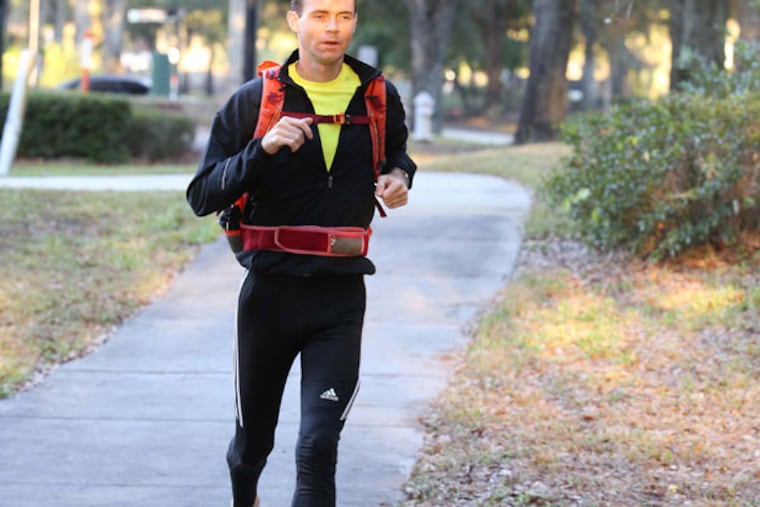Barefoot runner turns heads during daily commute
Five days a week, Mike Funk, 37, jogs from his home in Altamonte Springs, Fla., to his job as a web developer at a Maitland, Fla., publishing firm. He runs again at lunch, and at the end of the day he straps on his backpack and heads home the same way. All without benefit of shoes.

(MCT) ORLANDO, Fla. − Mike Funk jokes that he likes to feel the earth move under his feet.
Five days a week, Funk, 37, jogs from his home in Altamonte Springs, Fla., to his job as a web developer at a Maitland, Fla., publishing firm. He runs again at lunch, and at the end of the day he straps on his backpack and heads home the same way.
All without benefit of shoes.
Funk has become known as "that barefoot runner guy," and he often gets puzzled looks from rush-hour motorists.
"People will yell out: 'Hey, where are your shoes?' or 'Do you need a ride?' or 'You really shouldn't do that,'" Funk said. "But I come up with short answers, because I'm trying to run."
Funk runs barefoot about 13 miles every day. And on weekends he runs another 20 miles, with his bare feet slapping the sidewalk or grass. So far this year, he has logged more than 2,500 miles, each one without shoes or socks.
"Barefoot running is more of a normal state of running," said Funk, a tall man with a string-bean physique and a cheerful smile. "It makes an otherwise boring run a whole lot more challenging and interesting."
Running barefoot has become so much a part of Funk's life that he recently sold his car and now jogs almost everywhere.
Funk is among a growing number of runners who have ditched their running shoes for no shoes at all. And like Funk, these runners with naked feet feel that's the way Mother Nature intended running to be.
But is it better for the feet and body, as Funk and other barefoot enthusiasts claim?
Carey Rothschild, a physical therapist and an instructor at the University of Central Florida, said "the jury is still out" on that question.
Rothschild, who's also a runner, spent years studying barefoot running, and this year her findings were published in the Journal of Strength and Conditioning Research.
She points out that barefoot runners tend to land on the middle or front of the feet, whereas shoed runners will often strike the ground with their heel first and then roll the foot forward.
"There is sound evidence that there is a biomechanical difference between running barefoot and running with shoes. But we don't know if that translates to less injury," Rothschild said.
Dr. Cary Zinkin, a podiatric sports physician in Deerfield Beach, Fla., and a spokesman for the American Podiatric Medical Association, agreed, saying "there is no absolute or definitive evidence that it (barefoot running) either hurts you or helps you."
"But you will find a majority of podiatrists not really recommending it," he said. "We feel the possibility of getting hurt is greater when you run barefoot. You can step on things. You can cut yourself. You can pick up micro-organisms and infectious agents, and that can lead to greater problems."
But if a runner insists on going barefoot, Zinkin, who has run nine marathons and 30 half-marathons, advises starting on a soft surface such as a rubberized track or grass and slowly building up mileage.
Funk's interest in barefoot running was sparked about a year ago when he read an article touting its benefits. He had been running in shoes for years but wanted to try something different. At first he was able to run only half a mile without shoes because of the discomfort. But after several weeks, a thick, leather-like callus developed on the bottom of his foot.
His thick soles now help protect him from glass, nails, twigs and other nasty, sharp objects he encounters while running, he said.
"You have to keep a hawk's eye on the ground," Funk said. "I sometimes will find tiny pieces of glass in my foot, but that happens about every 500 miles or so."
Funk's wife, Bonni, a counselor, said she wasn't surprised when her husband decided to take up barefoot running.
"He's a big goal-setter and someone who is always trying new things," she said. "Although there are times when it's nighttime, and I'm wondering if he's OK. But he watches out for himself."
___
(c)2012 The Orlando Sentinel (Orlando, Fla.)
Visit The Orlando Sentinel (Orlando, Fla.) at www.OrlandoSentinel.com
Distributed by MCT Information Services